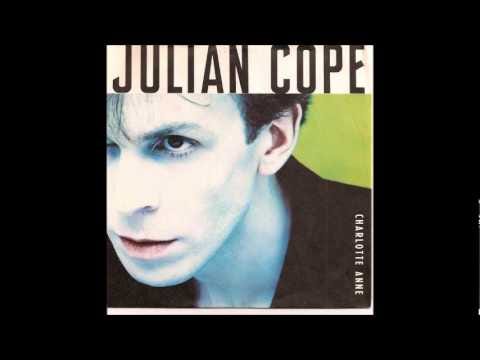Modern Rock Tracks No. 1s - Julian Cope and "Charlotte Anne"
British musician scores his first and only chart-topper, a haunting lamentation on loneliness and longing
Julian Cope - “Charlotte Anne”
Weeks atop the Billboard Modern Rock Tracks chart: 1 (1/21/89)
Billboard Hot 100 chart toppers during this time:
Phil Collins - “Two Hearts”
In the long history of Billboard magazine, many songs chart for weeks and fail to reach the top spot. Reaching #1 on any chart requires more than just a great song; indeed, Billboard devoted an entire article to songs which reached #2 on the flagship Hot 100 chart but failed to reach #1. If you check out the list, you’ll see there are some really great songs, and in some cases, those songs are blocked from the top spot by songs that are slightly less memorable (take Tommy Roe’s “Dizzy,” which kept Creedence Clearwater Revival’s terrific “Proud Mary” out of the top spot).
Of course, there’s no intentional bias. The Billboard charts are an amalgam of radio airplay and sales numbers, and are often a reflection of a single moment in time, rather than a long-term legacy. I don’t know if Los Del Rio’s “Macarena (Bayside Boys Mix)” is a better song than Donna Lewis’s “I Love You Always Forever” or Celine Dion’s “It’s All Coming Back To Me Now,” but I do know that without the national sensation of the Macarena dance in the summer of 1996, odds are good that both of those ladies would have scored Hot 100 chart toppers.
Why the discussion about near-miss #1s on the Hot 100? I thought some context was needed to describe the ascension of Julian Cope’s only #1 hit on the Modern Rock Tracks chart, a one-week blip bookended by two R.E.M. smashes. Cope’s “Charlotte Anne” was destined to be one of those tracks relegated to a perpetual runner-up status, but somehow it managed to sneak past the Athens, Georgia rockers for a single week.
Make no mistake: “Charlotte Anne” is not a bad song. And college/alternative rock station program directors and listeners clearly enjoyed it as well. During the eight-week run of “Orange Crush” atop the MRT charts, “Charlotte Anne” was stalled at #2 every time, a British post-punk mainstay going toe-to-toe with the longtime college radio favorites striking big with their major-label debut. It seemed like Cope was destined to remain a chart footnote, but with the right mix of fortune, timing, and a solid track, Cope reached the top.
But who is Julian Cope? The name didn’t ring any bells for me, and a quick review of his chart successes (or lack thereof) helps explain why I might not have heard of him. Cope didn’t make many waves in the U.S., even though he’d been a part of the music scene in the U.K. since the late 1970s. Unlike acts like Siouxsie and the Banshees, Psychedelic Furs and Big Audio Dynamite, Cope never found sustained success on any of the U.S. charts, save for his lone #1 hit on the MRT.
In the U.K., Cope was a mainstay on the British charts, though never at the high levels he briefly attained on the MRT chart. His highest-charting single, 1986’s “World Shut Your Mouth,” topped out at #19 on the U.K. charts and actually made the U.S. Hot 100, peaking at #86. It’s a stripped-down version of the musical flavor of the time, echoing bands like R.E.M. And it’s a decent track, actually, notching more than 8 million streams on Spotify.
In “Charlotte Anne,” Cope takes a different approach, going for more of a haunting vibe, singing what amounts to a lamentation of loneliness and longing. Listening from a 2023 point of view, I can’t help but notice the similarities with Dave Matthews Band’s “Don’t Drink The Water,” right down to its ethereal, earthy tone, though the two songs couldn’t be more different thematically. “Charlotte Anne” is an interesting take on late ‘80s alternative rock, with the DNA of new wave and post-punk forming a sound that is quite different from the other songs on the charts at this time.
Following the brief chart success of “Charlotte Anne,” Cope managed to score two other MRT top-10 hits: the follow-up single “5 O’Clock World” peaked at #10 on MRT in 1989. A cover of the Vogues’ 1966 Hot 100 #4 hit, this one had a modern edge but ultimately lacked the staying power of the original. “Beautiful Love,” a solid mix of horns and jangly guitars, topped out at #4 on MRT in 1991.
Cope may have long since left the music consciousness of the average U.S. music fan, but he continues to make music in the U.K. to this day. In 2022, he released his latest solo effort “England Expectorates,” with lead single “Cunts Can Fuck Off.” (I know what you’re thinking, but Cope does take a moment to explain the inspiration for the single in a recent live performance. It’s actually pretty catchy!)
“Charlotte Anne” will always have a place in the history of U.S. modern rock, the capstone of a brief love affair with chart popularity but was merely one moment in a music career that spans more than four decades.
Rating: 6/10
Chart notes:
Not much to talk about this week, but the one track is pretty solid if you like Scottish folk rock.
“Fisherman’s Blues” by The Waterboys: The title track to the 1988 album by The Waterboys is considered to be one of the band’s best. This folk-rock infused track is another stunning lament on life, about the roads one takes and imagining a different path. This track peaked at #3 behind “Charlotte Anne.”



